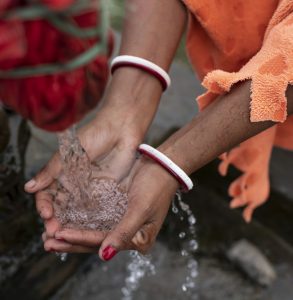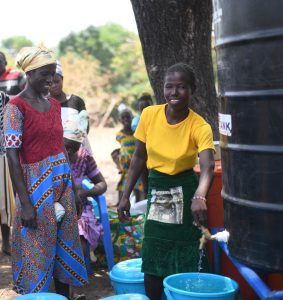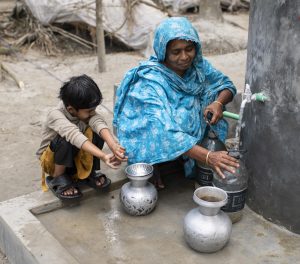“Without access to water, you can’t even begin to think about your health—it’s the most fundamental need.
Make water available first; only then can everything else begin to grow.”
Komodo Water representative, Indonesia.

Every day, millions of women and girls face risks to their safety, health, and education simply because they lack access to water close to home. Fetching water turns into hours of walking, carrying heavy loads, and enduring the constant threat of harassment or violence.
In 2024, an estimated 2.1 billion people worldwide lacked access to safely managed drinking water services — 611 million had no access to water at all. At the same time, 3.4 billion people did not have access to safely managed sanitation (WHO/UNICEF/JMP 2025). Women and girls are disproportionately affected by this crisis, spending an estimated 200 million hours each day collecting water. The burden restricts their opportunities, forcing many out of school and leaving them vulnerable to injury, illness, and violence.
Water, sanitation and hygiene (WASH) enterprises play a vital role in bridging this gap, providing affordable, sustainable and locally adapted solutions. By putting gender at the heart of their businesses and operations, their impact can be even greater — not only addressing urgent needs but also unlocking opportunities for millions of women and girls.
Yet, despite this reality, the specific linkages between inadequate access to WASH and its gender impacts — particularly in relation to market-based solutions — have been underexplored. That is why Aqua for All and Roots of Impact commissioned research as part of the Impact-Linked Fund for Water, Sanitation and Hygiene (ILF for WASH) programme. The summary of the findings, presented in the Insights Brief “Strengthening Impact Measurement and Management at the WASH and Gender Nexus”, highlights how enterprises and their partners can better integrate gender into WASH solutions, measurement, and investment strategies.
Grounded in practice: Insights from enterprises, experts and research
The findings draw on comprehensive desk research, as well as interviews with nine subject-matter experts and 11 WASH enterprises across Africa and Asia, representing diverse business models and stages of maturity. The sample of enterprises included seven drinking water enterprises and four sanitation-focused enterprises, offering various solutions such as piped household connections, water kiosks, and public and private sanitation services. Together, these organisations represent different points along the WASH value chain and demonstrate the range of market-based approaches in practice.
Evidence of change
The research confirms that when water and sanitation are available close to home, lives change. Access to adequate WASH services is strongly correlated with immediate and medium-term gender outcomes, including:
- Safety and security – reduced risks of gender-based violence, harassment or assault.
- Physical health – lower incidence of waterborne diseases and physical injury from carrying heavy loads over long distances.
- Surplus time – freeing up hours every day for education, work, or rest.
Over the longer term, these gains pave the way for psychosocial wellbeing, greater socio-economic empowerment, and increased leadership opportunities for women.
While WASH alone cannot transform gender dynamics, it is a powerful contributor. The research highlights that market-based WASH approaches must be gender-sensitive and responsive, ensuring solutions are adapted to the realities of women and girls in different contexts.

Why measurement matters
One of the most significant findings of the research is the gap in impact measurement and management (IMM) practices, which limits the potential of gender-responsive strategies. Among WASH enterprises, gender-specific IMM remains limited. Differences in data collection—such as access to end-user data, the choice of metrics and the extent of data analysis— often result in an incomplete picture of outcomes.
Because many ILF for WASH contracts span only two to four years, short- to medium-term gender outcomes are particularly relevant for structuring incentives. Using proxy indicators —such as safety improvements or increases in school attendance among girls — can provide practical ways to track impact within these timelines.
The Insights Brief provides a snapshot of the research findings, including a mapping of gender outcomes in WASH — specified by sub-sector or type of WASH solution — a framework for contextual conditions to consider, as well as best practices and recommendations for integrating gender into WASH practices.
Practical guidance
The research has been translated into action-oriented recommendations to support enterprises, investors, and ecosystem actors. Key highlights and recommendations include:
- Integrating gender into IMM systems: Practical guidance to help WASH enterprises track meaningful gender outcomes and embed the within operational frameworks.
- Using proxy metrics: Recommended output indicators for each outcome theme that enterprises can use to strengthen gender measurement. These indicators help demonstrate progress within shorter project cycles, while recognising that context matters and longer-term outcomes — such as women’s economic autonomy — take more time.
- Providing technical assistance: Many enterprises lack the skills or tools for gender-responsive strategies and IMM. Dedicated support can help ensure that gender becomes an integral part of business models.
- Decision-making toolkit: Developed as part of this research, the toolkit supports WASH practitioners, particularly those involved in Impact-Linked Finance (ILF), identify relevant gender outcomes, prioritise metrics and tailor approaches to different contexts.

Our commitment
At Aqua for All, we believe that access to safe water and sanitation is both a human right and a pathway to equality. We are committed to ensuring that gender considerations are not an afterthought but a central part of WASH interventions. The Insights Brief is more than research; it is a call to action for enterprises, investors, and development partners to work together towards inclusive solutions that leave no one behind.
When women and girls no longer have to walk for hours to fetch water, the ripple effects are profound. They become safer, healthier, and freer to pursue education, income, and leadership opportunities. With every litre of water that flows closer to home, the foundations of equality and dignity grow stronger.
Read the Insights Brief “Strengthening Impact Measurement and Management at the WASH and Gender Nexus”.
For more information, please contact us at info@aquaforall.org.